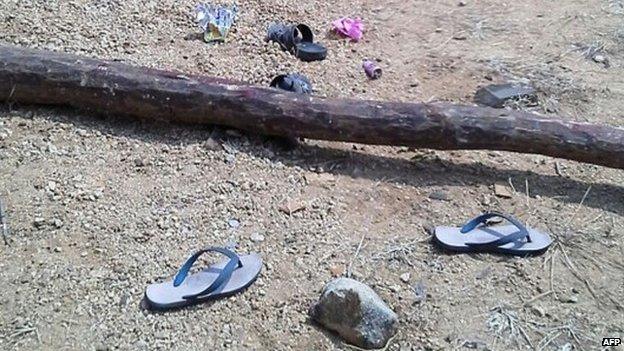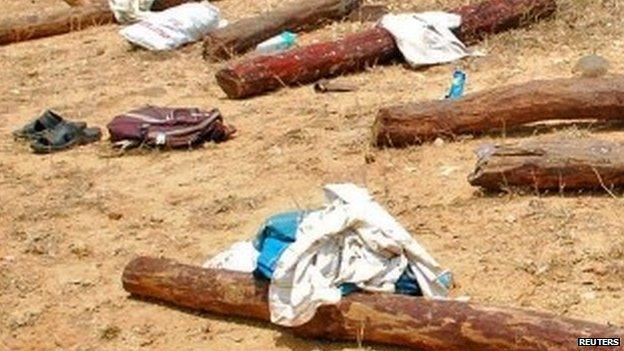India red sandalwood: Questions over 'smuggler' killings
- Published

Most of the victims were labourers from neighbouring Tamil Nadu state
Police in India's Andhra Pradesh state are accused of excessive force after killing at least 20 suspected red sandalwood smugglers. Police say they acted in self-defence but human rights groups and politicians want an investigation. BBC Hindi's Imran Qureshi and BBC Tamil's K Muralidharan look at the unanswered questions.
Police say they challenged a group of more than 100 smugglers who were cutting down trees in the remote forests near the popular pilgrimage town of Tirupati in Chittoor district.
They said when asked to hand over the logs, the woodcutters refused and attacked the police with axes, sticks and stones in two separate areas of the forests. Police say that they fired in self defence.
Red sandalwood or red sanders is a protected species of tree found in the Western Ghats of India. It is grown in at least four districts of Andhra Pradesh.
The trees are in short supply and restrictions on exports mean that they fetch thousands of dollars on the international black market. Demand is high in countries such as China and Japan, where the wood is used to make furniture, musical instruments and even toys.
Human rights group say the police must provide answers to the following questions:
Why does it appear no warning shots were fired in the air before police killed the woodcutters?
Why was there no apparent attempt to arrest the men before opening fire?
How is it that 13 of the 20 dead have bullet injuries above their waist, and most of the suspected smugglers were shot in the back?
The bodies were found in two groups a kilometre apart. Did two groups of policemen open fire?
Were the dead men actually smugglers or workers hired by a smuggling gang?
"All evidence points to the labourers being surrounded and shot dead. This is slaughter of 20 people," said VS Krishna, general secretary of the Andhra Pradesh Human Rights Forum.
'Fake encounters'
A journalist who visited the scene of the killings as well as the hospital where the bodies of the dead were taken for post mortem said that most of those killed had been shot "below the neck and it appears that they were either running away or were shot from behind".
The police reject the allegations. In fact, they said they began firing when they found out that they were outnumbered by the woodcutters.
"We were 40-50 people and only 8-10 of us were armed. When they started attacking, we started firing to save our lives," Ashok Kumar, a policeman who participated in the operation, said.

Rights groups have questioned the way the woodcutters were killed.
However, this has not deterred groups like Amnesty International from demanding an investigation into the incident.
"There must be a criminal investigation to determine whether the police used excessive force, and whether the killings amount to 'fake encounters', or staged extrajudicial executions," Abhirr VP of Amnesty International India said.
"The police are not above the law, and must not be treated like they are."
Amnesty said in a statement that no police had been injured in the incident, although police say 11 of their number were admitted to hospital.
Smugglers?
Rights groups also say the fact that the bodies of the woodcutters were found in two separate locations - in Eethagunta and Srivarimuttu - throws up questions about what exactly happened.
"The distance between the two places is one kilometre. Interestingly all the bodies were found in the open space. It would not have been difficult for them to run towards the woods and hide," said another journalist, who visited the area.
Most of those killed are believed to be Tamils and rights group wonder whether they can be called smugglers.
Many reports say they had been hired by smugglers at wages of 3,000-5,000 ($48-$80; £32-£53) a day - considered lucrative by local standards.
In the war against red sandalwood smuggling, the victims are often labourers, and many wonder why the kingpins go free.
Predictably, there has been an angry reaction in neighbouring Tamil Nadu state to the killing.
Chief Minister O Pannerselvam was swift to demand an investigation and the National Human Rights Commission said there had been a "serious violation" of human rights.
"Even if the persons had been engaged in illicit tree cutting, efforts could have been made to apprehend them rather than take such drastic action and cause such high casualties," Mr Pannerselvam said.
Human rights
There have been clashes between the police and red sandalwood cutters in the region in the past.
In December 2013, loggers allegedly stoned two forest officials to death in the Seshachalam area. In November 2014, 84 suspected timber smugglers were arrested while cutting trees.
There have been at least seven clashes in recent years - rights groups believe that a number of them were extrajudicial killings. Last year they say at least eight suspected smugglers were killed.
"In many cases the so-called smugglers are poor woodcutters employed by organised gangs," said Amnesty's Abhirr VP.
"The curbing of red sandalwood smuggling must not be used as an excuse to ignore human rights."